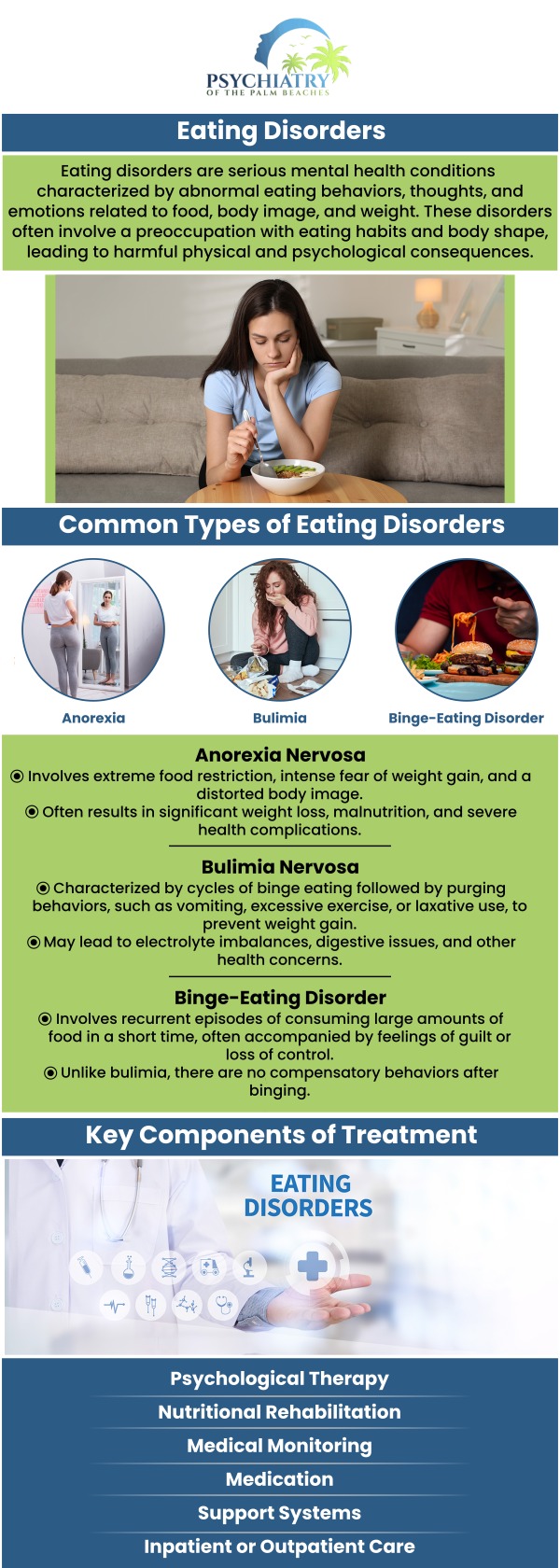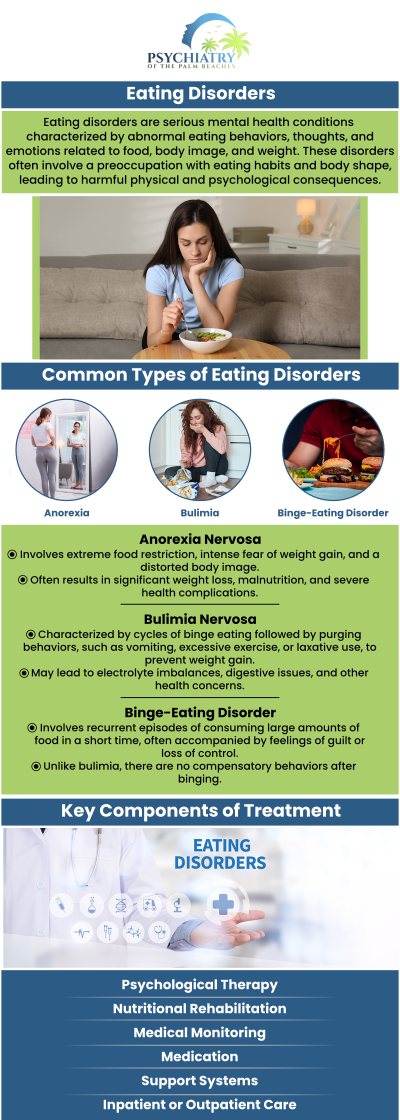Binge Eating Disorder Treatment Q&A
Binge Eating Disorder (BED) is a serious eating disorder marked by frequent, uncontrolled binge eating episodes. Unlike other eating disorders, BED doesn’t involve compensatory behaviors. Individuals with BED often experience feelings of shame and guilt. Dr. David Husted and the team at Psychiatry of the Palm Beaches offer comprehensive care for individuals with BED. For more information, contact us or book an appointment online. Visit Psychiatry of the Palm Beaches serving Jacksonville, Boynton Beach, Palm Beach Gardens, Stuart, Royal Palm Beach, Port St. Lucie, Melbourne, Fort Lauderdale, and Jupiter, FL.




Table of Contents:
What is Binge Eating Disorder and how is it defined?
What are the main symptoms of Binge Eating Disorder?
How is Binge Eating Disorder different from Bulimia Nervosa?
What causes Binge Eating Disorder to develop?
Our team of experienced psychiatrists at Psychiatry of the Palm Beaches specializes in diagnosing and treating a broad range of psychiatric disorders, including Binge Eating Disorder.
Binge Eating Disorder (BED) is a prevalent eating disorder defined by recurrent episodes of consuming unusually large amounts of food, often rapidly and past the point of comfort, coupled with a sense of loss of control. Unlike other disorders involving disordered eating, individuals with BED do not engage in compensatory behaviors like purging, extreme dieting, or intense exercise after binge episodes. These episodes frequently leave individuals feeling distressed, ashamed, or guilty, leading to a cycle that can impact both emotional well-being and physical health.
In accordance to the DSM-5, recurrent episodes of excessive fast food consumption, frequently coupled with feelings of guilt and shame, are the hallmark of binge eating disorder (BED). Any age, gender, or body type can be affected by this illness, which frequently manifests as a coping strategy for underlying mental anguish.
Early recognition and support can make a significant difference, as BED is treatable with a combination of therapy, lifestyle changes, and sometimes medical intervention.
BED is a chronic and compulsive disorder, more than the occasional overindulgence in food. It’s characterized by consuming excessive amounts of food rapidly in a short period, often leading to significant distress and potential health complications. Our experienced psychiatrists can help identify these symptoms and offer suitable treatment plans.
We have observed that individuals with BED often eat at an unusually fast pace, driven by an intense desire to eat, despite not feeling physically hungry. They may resort to eating alone due to the embarrassment of the food quantity consumed. Our psychiatrists are experienced in dealing with such sensitive issues and can provide the necessary therapy and interventions to address these behaviors.
At Psychiatry of the Palm Beaches, we also recognize that BED frequently causes emotions of guilt, shame, and discomfort, prompting people to utilize binge eating as a coping method. Our team can provide therapeutic strategies to break this vicious cycle and develop healthier coping mechanisms.
Another indication of BED is physical pain or discomfort brought on by overeating. This goes beyond simply overindulging at a holiday feast to include utilizing food to deal with stress or bad feelings to the point of illness. We can help individuals identify these patterns and devise strategies to address them.
Unlike other eating disorders like bulimia nervosa, those with BED typically don’t engage in compensatory behaviors such as purging or excessive exercise. We at Psychiatry of the Palm Beaches understand this key difference and tailor our treatment plans accordingly.
At Psychiatry of the Palm Beaches, we understand the complex nature of mental health disorders like Binge Eating Disorder (BED) and Bulimia Nervosa (BN). Our dedicated team of professionals is well-versed in distinguishing between these disorders and providing tailored treatment plans based on the specific symptoms and underlying factors of each condition.
Our team of professionals makes certain that individuals who frequently engage in binge eating—also referred to as excessive eating—get the assistance they require. We are cognizant of the key differences between BED and BN, such as the compensatory behaviors that follow a binge in individuals with BN. Unlike BN, individuals with BED do not engage in such behaviors after a binge.
At our practice, we assess the frequency and duration of binge episodes to make accurate diagnoses. We are aware that both BED and BN involve significant body image disturbances, but their nature differs. We are equipped to handle the mood disorders, particularly depression and anxiety, that are common features in both BED and BN.
We recognize the health risks associated with these disorders. For BED, which is often related to clinical obesity, we address conditions such as heart disease, high blood pressure, and type 2 diabetes, among others. In contrast, for BN, we manage severe medical complications such as electrolyte imbalances and gastrointestinal problems caused by chronic purging behaviors.
Our treatment approaches for these disorders often begin with Cognitive Behavioral Therapy (CBT), focusing on changing negative thoughts and behaviors related to eating. Other treatment modalities may include medication, nutritional counseling, and support groups.
At Psychiatry of the Palm Beaches, we emphasize that while BED and BN share some similarities, they are separate disorders, each with its own diagnostic criteria, health implications, and treatment methods. We believe in early detection and appropriate treatment for managing these disorders and preventing severe health consequences.
Our team of professionals recognizes that BED is far more than just overeating or a lack of willpower – it’s a serious eating disorder influenced by a range of genetic, biological, psychological, social, and environmental factors.
We understand the significance of genetic predisposition in the development of BED, and we work to discern whether genes affecting brain chemistry, appetite regulation, impulsivity, and emotional processing may be playing a role in your condition.
Our expertise extends to understanding the biological factors at play. We examine potential alterations in brain regions associated with eating control, reward processing, and emotional regulation. We also look for imbalances in neurotransmitters, which can influence mood and appetite and could be key in the development of BED.
Additionally, we recognize the profound role that psychological factors, societal pressures, and environmental influences can have on BED onset. Our team is experienced in helping patients navigate co-existing mental health conditions, societal expectations, family dynamics, and personal relationships that may be contributing to their disorder. We are committed to comprehensive evaluation and effective, individualized treatment plans for BED. With our in-depth understanding of the multifaceted causes, we aim to help our patients through prevention strategies, early detection, and therapeutic interventions, all designed to manage and overcome this disorder.
Overcoming Binge Eating Disorder with Our Team
Our team offers expert treatment for Binge Eating Disorder at Psychiatry of the Palm Beaches. Our comprehensive approach involves addressing the emotional, psychological, and behavioral factors contributing to binge eating. By using therapeutic techniques and providing a supportive environment, our team helps patients achieve lasting recovery and a positive relationship with food. We encourage you to contact Psychiatry of the Palm Beaches if you or a loved one is experiencing symptoms of Binge Eating Disorder. We’re here to support you as you manage this complicated illness and strive for a healthy future. For more information, contact us or book an appointment online. We have convenient locations to serve you. We serve patients from Boynton Beach FL, Delray Beach FL, Palm Beach Gardens FL, Jupiter FL, Stuart FL, Palm City FL, Royal Palm Beach FL, Wellington FL, Citrus Ridge FL, Jacksonville FL, Riverside FL, Port St. Lucie FL, Beau Rivage West FL, Melbourne FL, Palm Bay FL, Fort Lauderdale FL, Hollywood FL, Jupiter FL, North Palm Beach FL, and surrounding areas..
Check Out Our 5 Star Reviews



Additional Services You May Need
▸ Mental Wellness
▸ Relationship Coaching
▸ Depression and Mood Disorders
▸ Women’s Health
▸ Panic Disorder
▸ Medications Management
▸ Men’s Health
▸ Individual Psychotherapy
▸ Bipolar
▸ ADHD
▸ Geriatric Mental Health
▸ Couple’s Counseling
▸ Obsessive Compulsive Disorder
▸ Social Phobia Treatment
▸ Eating Disorders
▸ Post Traumatic Stress Disorder
▸ Psychotic Disorders


